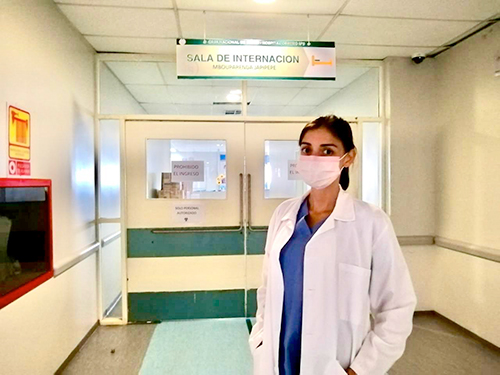Take Five: "What we are going through right now is a life lesson for everyone."
Natalia Klinsky Amelunge is 28 years old, and this is her second year working as a general practitioner. She works in the area of epidemiology of COVID-19 at the National Health Fund in Bolivia and the Anita Leigue Municipal Health Center. She spoke with UN Women about the challenges women face in the frontline response in Bolivia.Date:

How has the COVID-19 crisis influenced your work?
I studied medicine so that I could help people, I love my job, I love caring for patients, and I am proud to be part of the health care providers in these difficult times for humanity. I have been practicing my profession for two years, and as part of this new generation of doctors, I have a firm commitment to watch over the right to health, and even more so in this challenging stage, we are facing with COVID-19.
What are the unique challenges faced by women on the front line of care?
Women are usually the ones who care for our children, our parents, and as we know, older patients are the ones who are most at risk. Here in Bolivia, we've noticed that the health care personnel who are in have the majority of contact with COVID-19 patients are women. Fortunately, I am a young person who is in good health, and I do not have children at home, but I do live with my mother; I am terrified of infecting her. However, many colleagues, doctors, nurses, cleaning, and laboratory staff, many of whom are single mothers, have young children under five years of age that they have to care for, which ultimately, puts them and their children at risk. The great fear we all have is that we have brought the virus home or are afraid of having caught it and having to leave our children, parents, or family behind if we have to be hospitalized.
What role are women playing in the response in your country?
In health care, no matter what gender, we are all in this together. For example, in the front line, which is pre-triage and triage, we find brave doctors, both men and women. The testing is done by trained laboratory staff, regardless of whether they are male or female. All the doctors, both men, and women take turns supervising patients that are suspected to have the virus, that have tested positive or are in intensive care. However, at the hospital, most of the nurses and the vast majority of our cleaning staff are women, but in this war we are all soldiers.
How are you working on the response to reach women and vulnerable populations?
In Bolivia, UN Women is carrying out campaigns targeted at different areas in order to visibilize the different ways this pandemic is affecting women. For example there's a campaign aimed at raising awareness about the fact that some women are doing up to three times more work once they come home after working at a hospital, bank or supermarket, to fulfill their role as mother, daughter, and wife.
There's a campaign focused on the prevention of violence against women in times of COVID-19.
UN Women in Bolivia also provides humanitarian assistance in migrant camps, where many Bolivian citizens are located on the border with Chile. UN Women is supplying food and other first necessity items such as clothing and blankets to contribute to the humanitarian assistance that is also being coordinated with the government.
What effect do you think this pandemic will have on women and girls in the future in Bolivia?
I think that what we are experiencing right now is a life lesson for everyone. Many women have realized how strong we are. Many people are going starving during this time, but we've seen women take charge and lead several solidarity campaigns. People in general are more supportive, we’ve had to be brave in a difficult situation and mobilize resources like never before to get food to areas where it is needed most, reaching women, children, the elderly, and even animal shelters.
Since women have been first responders in this crisis, I think we can feel proud of what we’ve accomplished and demand to be treated with respect and equality, both personally and professionally, demonstrating that women can take on multiple roles, like being spouses and mothers and coping with work and family, and let men know that they can do the same.
I believe that the effect it will have on Bolivian women and girls in the future is to be aware of the strength we have collectively as women especially how we were able to face adversity, and to know that we can handle anything, we are warriors!
I don’t think we can ever forget that we went through a global pandemic and that we stood firm and faced it all, and that should give us greater self-esteem and respect as women.
As a woman and a doctor, starting my career in the healthcare sector, I feel proud to have been at the forefront of this battle, helping people, and I feel prepared to face anything that comes my way.